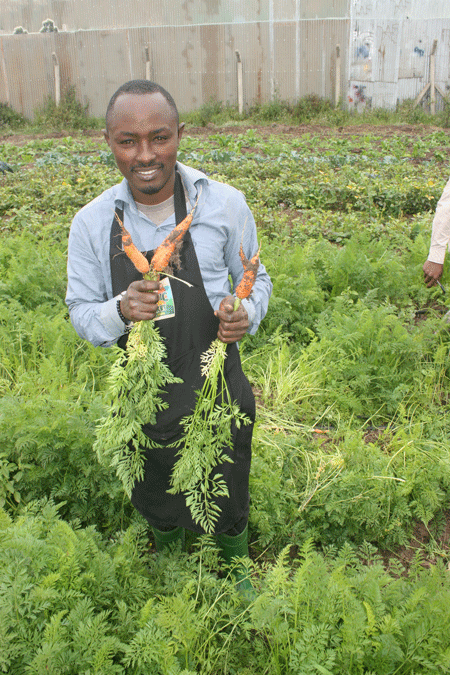
Organic farming at Nyumbani Karen Organic farm
Organic farming at Nyumbani Karen Organic farm
Nyumbani Karen Organic farm, run by Nyumbani Children Home in Karen is engaging in a rapidly popular mode of farming, organic farming. The farm has 2 acres under organic farming where they grow capsicum, spinach, cabbages, broccoli, carrots tomatoes, kales, beetroots among others.
The farm has been continually practicing organic farming which has earned them loyal customers. These customers are particular about what they eat and have become wary of the chemicals that are being pumped into plants.
This wave of organic products is gaining traction around the globe as more and more people suffer and die from lifestyle diseases like cancer. This has precipitated the need for wholesome foods, traditional vegetables and fruits that are chemical free. To ensure that the products are truly organic, the farm gets an annual EnCert accreditation. EnCert is a Kenyan certification body which offers organic certification services to individual producers as well as producer groups. This certification guarantees the customer that the farm engages in purely organic processes in the production of its wares.
This certification is important because conventional farmers and brokers have started passing off conventional produce as organic. This affects the trust of the customers who become cautions. The brokers are making a bad name for genuine organic farmers because they are selling contaminated and tainted produce at the premium prices that organic produce fetches.
Their water for irrigation comes from a borehole on site and a water test was done to ensure that the water is fit for farming. Likewise, a soil test was commissioned to highlight the various ways that the organic farming could be achieved. The soil testing firm gave recommendations on what to produce organically and that is how they settled for carrots, spinach, purple cabbage and broccoli.
The certification enables the farm to sell its produce at a local organic farmer’s market in Karen to fund Nyumbani Children’s home activities. John Mwanzia, the farm manager says that the sector has good returns because the customers are willing to pay a premium price for organic produce. The farm is subdivided into beds that run 2 feet wide and 60 metres long. A single bed will produce about 30 bunches of spinach. A bunch is a few leaves that comfortably fit in one’s hand. The bunch is sold at Kshs. 50. Carrots are sold in an approximation of what seems to amount to a kilo at Kshs. 100 a Broccoli is sold at Kshs. 150 while a capsicum is sold at Kshs. 10 a piece regardless of size.
To maintain the organic certification, the farm does not use any chemicals to spray the plants. Instead, Mr. Mwanzia uses various methods to combat pests and diseases. The most interesting one is spraying cow’s milk onto the carrot leaves to manage powdery mildew. This is done twice a week. He also makes botanical pesticides using marry gold leaves, neem and chillies. “I boil them together to bring out the herbal remedies”, says Mwanzia. The resultant solution is then sprayed twice a week onto the crops.
Another method he uses is planting repellant crops like leafy onions that repel aphids and snails. “I also use cultural methods like wood ash to spread onto leaves to chase away aphids” says Mwanzia.
The farm also uses compost manure that is fully decomposed to replenish the soil with nutrients. This is due to the fact that they are not allowed to use any chemical fertilizers. Mwanzia sources his seeds from companies which has good reputation for quality seeds. The seed are propagated at the farm to cut on costs of buying expensive seedlings
The farm has 300 catfish that are being reared in a raised concrete tank that is 3 metres wide and 3 metres long. They fish are typically harvested after 5 months but the cold weather in Karen slows down their growth spur significantly. Mature fish normally weighs 2 kilograms. The advantage of having the fish is that the farm uses the water that they drain from the fish tank as foliar spray. The farm recently introduced 8 bee hives at one corner of the farm.
Mr. Mwanzia studied organic farming at the Kenya Institute of Organic Farming at Juja and also he was part of an exchange program with the Rural Community Development centre in Uganda.

